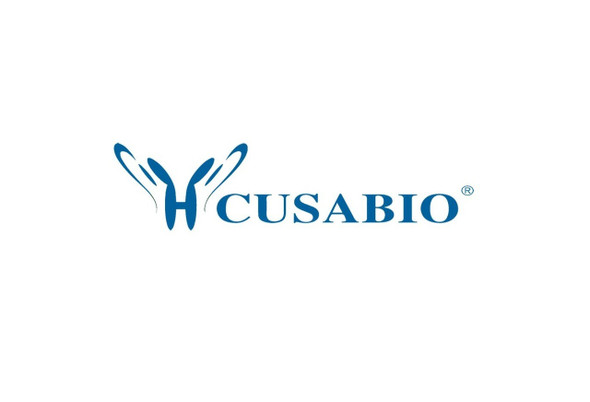Cusabio Human Recombinants
Recombinant Human C-C motif chemokine 25 (CCL25) | CSB-EP004789HU
- SKU:
- CSB-EP004789HU
- Availability:
- 13 - 23 Working Days
Description
Recombinant Human C-C motif chemokine 25 (CCL25) | CSB-EP004789HU | Cusabio
Alternative Name(s): Chemokine TECK;Small-inducible cytokine A25;Thymus-expressed chemokine
Gene Names: CCL25
Research Areas: Immunology
Organism: Homo sapiens (Human)
AA Sequence: QGVFEDCCLAYHYPIGWAVLRRAWTYRIQEVSGSCNLPAAIFYLPKRHRKVCGNPKSREVQRAMKLLDARNKVFAKLHHNTQTFQAGPHAVKKLSSGNSKLSSSKFSNPISSSKRNVSLLISANSGL
Source: E.coli
Tag Info: N-terminal GST-tagged
Expression Region: 24-150aa
Sequence Info: Full Length of Mature Protein
MW: 41.2 kDa
Purity: Greater than 90% as determined by SDS-PAGE.
Relevance: Potentially involved in T-cell development. Recombinant protein shows chotactic activity on thymocytes, macrophages, THP-1 cells, and dendritics cells but is inactive on peripheral blood lymphocytes and neutrophils. Binds to CCR9. Isoform 2 is an antagonist of isoform 1. Binds to atypical chokine receptor ACKR4 and mediates the recruitment of beta-arrestin (ARRB1/2) to ACKR4.
Reference: The DNA sequence and biology of human chromosome 19.Grimwood J., Gordon L.A., Olsen A.S., Terry A., Schmutz J., Lamerdin J.E., Hellsten U., Goodstein D., Couronne O., Tran-Gyamfi M., Aerts A., Altherr M., Ashworth L., Bajorek E., Black S., Branscomb E., Caenepeel S., Carrano A.V. , Caoile C., Chan Y.M., Christensen M., Cleland C.A., Copeland A., Dalin E., Dehal P., Denys M., Detter J.C., Escobar J., Flowers D., Fotopulos D., Garcia C., Georgescu A.M., Glavina T., Gomez M., Gonzales E., Groza M., Hammon N., Hawkins T., Haydu L., Ho I., Huang W., Israni S., Jett J., Kadner K., Kimball H., Kobayashi A., Larionov V., Leem S.-H., Lopez F., Lou Y., Lowry S., Malfatti S., Martinez D., McCready P.M., Medina C., Morgan J., Nelson K., Nolan M., Ovcharenko I., Pitluck S., Pollard M., Popkie A.P., Predki P., Quan G., Ramirez L., Rash S., Retterer J., Rodriguez A., Rogers S., Salamov A., Salazar A., She X., Smith D., Slezak T., Solovyev V., Thayer N., Tice H., Tsai M., Ustaszewska A., Vo N., Wagner M., Wheeler J., Wu K., Xie G., Yang J., Dubchak I., Furey T.S., DeJong P., Dickson M., Gordon D., Eichler E.E., Pennacchio L.A., Richardson P., Stubbs L., Rokhsar D.S., Myers R.M., Rubin E.M., Lucas S.M.Nature 428:529-535(2004)
Storage: The shelf life is related to many factors, storage state, buffer ingredients, storage temperature and the stability of the protein itself. Generally, the shelf life of liquid form is 6 months at -20?/-80?. The shelf life of lyophilized form is 12 months at -20?/-80?.
Notes: Repeated freezing and thawing is not recommended. Store working aliquots at 4? for up to one week.
Function: Potentially involved in T-cell development. Recombinant protein shows chemotactic activity on thymocytes, macrophages, THP-1 cells, and dendritics cells but is inactive on peripheral blood lymphocytes and neutrophils. Binds to CCR9. Isoform 2 is an antagonist of isoform 1. Binds to atypical chemokine receptor ACKR4 and mediates the recruitment of beta-arrestin (ARRB1/2) to ACKR4.
Involvement in disease:
Subcellular Location: Secreted
Protein Families: Intercrine beta (chemokine CC) family
Tissue Specificity: Specifically expressed by thymic dendritic cells. High levels in thymus and small intestine.
Paythway: Chemokinesignalingpathway
Form: Liquid or Lyophilized powder
Buffer: If the delivery form is liquid, the default storage buffer is Tris/PBS-based buffer, 5%-50% glycerol. If the delivery form is lyophilized powder, the buffer before lyophilization is Tris/PBS-based buffer, 6% Trehalose, pH 8.0.
Reconstitution: We recommend that this vial be briefly centrifuged prior to opening to bring the contents to the bottom. Please reconstitute protein in deionized sterile water to a concentration of 0.1-1.0 mg/mL.We recommend to add 5-50% of glycerol (final concentration) and aliquot for long-term storage at -20?/-80?. Our default final concentration of glycerol is 50%. Customers could use it as reference.
Uniprot ID: O15444
HGNC Database Link: HGNC
UniGene Database Link: UniGene
KEGG Database Link: KEGG
STRING Database Link: STRING
OMIM Database Link: OMIM









